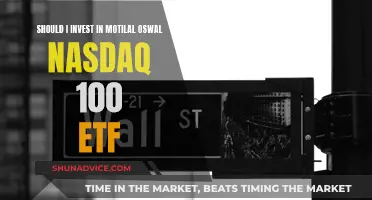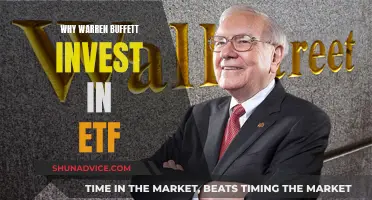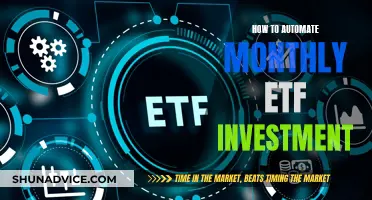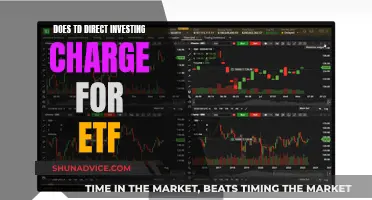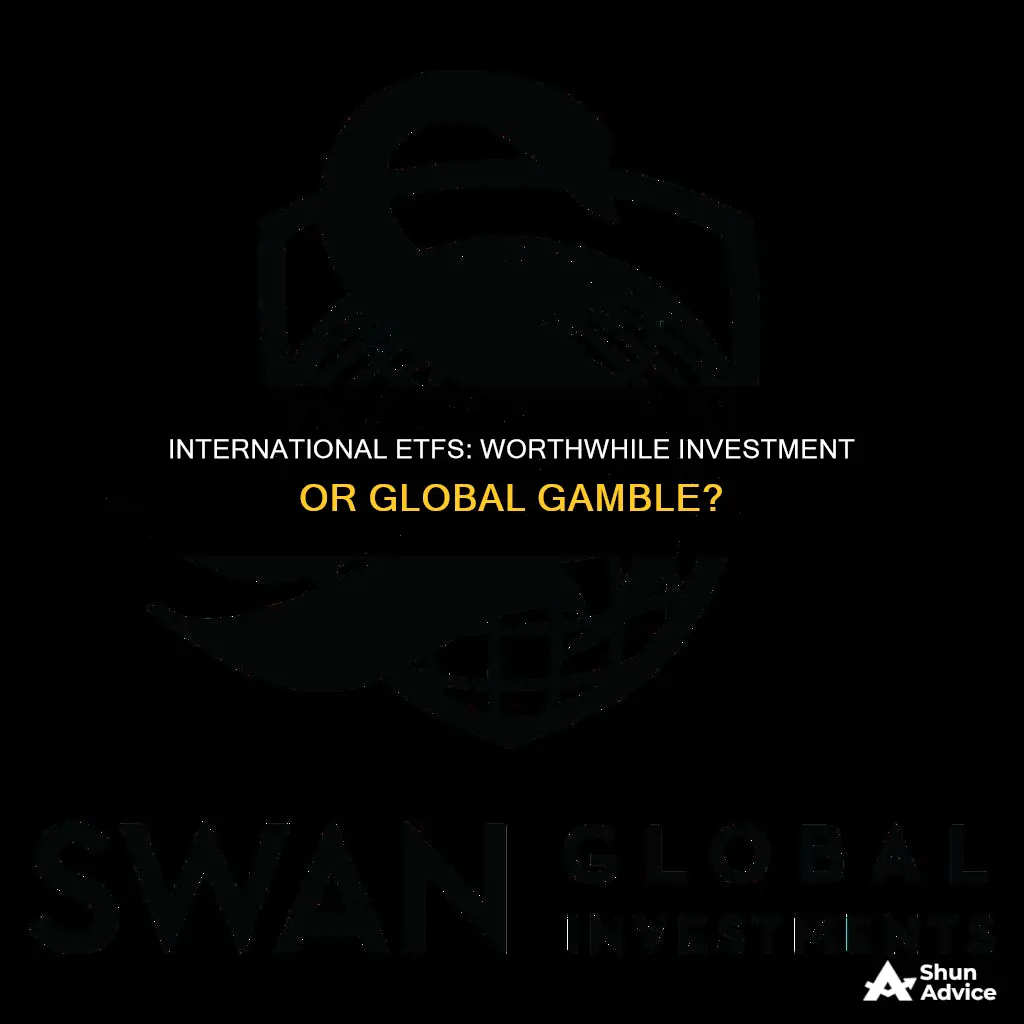
International exchange-traded funds (ETFs) are a great way to diversify your portfolio and gain exposure to foreign equities. These funds typically track a specific index that includes international stocks, bonds, or other assets, providing an easy way to invest in international markets without the need to research and invest in individual foreign companies. International ETFs can be country-specific or global, and they offer investors a way to mitigate risk and reduce the impact of market volatility by diversifying across different countries and regions. They are also a good option for those who want to round out their exposure to the global stock market, as US stocks represent a significant portion of the global market capitalization.
Some of the best international ETFs include the Vanguard FTSE Europe ETF (VGK), the iShares Core MSCI Total International Stock ETF (IXUS), and the Vanguard Total International Stock ETF (VXUS). When considering whether to invest in international ETFs, it is important to evaluate your financial goals, risk tolerance, and current market conditions.
| Characteristics | Values |
|---|---|
| Definition | Exchange-traded funds that invest specifically in foreign-based securities |
| Focus | Global, regional, or on a specific country |
| Holdings | Equities or fixed-income securities |
| Tracking | Global markets or a country-specific benchmark index |
| Risk | ETFs that invest in a single foreign country may carry higher risks than international ETFs that spread their investments among many countries |
| Diversification | Can be used to diversify the geographic and political risks associated with portfolios |
| Investment Style | Typically invested passively around an underlying benchmark index |
| Expense Ratios | Tend to be higher than average because of the higher costs to invest abroad |
What You'll Learn

International ETFs for beginners
International ETFs, or exchange-traded funds, are a great way to diversify your portfolio and gain exposure to foreign equities. They are typically passively managed and track a specific index, such as the FTSE All-World ex-US Index or the MSCI ACWI ex USA Index. These funds invest in a diverse range of countries and regions, including developed and emerging markets, providing investors with a way to mitigate risk and reduce the impact of market volatility.
When considering investing in international ETFs, it is important to keep in mind the following:
- Expense ratios: International ETFs tend to have higher expense ratios than average due to the higher costs of investing abroad. This is an important factor to consider as it eats into your returns.
- Diversification: One of the key advantages of international ETFs is the level of diversification they offer. By investing in a variety of countries and regions, you can protect your portfolio from country-specific economic downturns or political events.
- Risk: While international ETFs can provide strong diversification, investing in a single foreign country may carry higher risks. If a country undergoes a recession or financial hardship, an ETF that only invests in securities based there could underperform.
- Performance: Past performance does not guarantee future results, but it is still important to consider when choosing an international ETF. Look at the fund's long-term performance to get a sense of how it has historically performed.
- Holdings: Review the top holdings of the ETF to understand which companies and sectors make up the fund. This will help you determine if the ETF aligns with your investment goals and risk tolerance.
- Vanguard Total International Stock ETF (VXUS): This ETF invests in global stocks, excluding U.S. stocks, and tracks the performance of the FTSE Global All Cap ex U.S. Index. It is heavily weighted in Europe and has an expense ratio of 0.08%.
- IShares Core MSCI Total International Stock ETF (IXUS): This ETF provides access to global equity markets, excluding the United States, including developed and emerging markets. It has a low expense ratio of 0.07% and is suitable for less risk-inclined individuals.
- Vanguard FTSE All-World ex-US ETF (VEU): This ETF offers broad exposure to developed and emerging non-U.S. equity markets and tracks the performance of the FTSE All-World ex-US Index. It has an expense ratio of 0.07%.
- Vanguard FTSE Europe ETF (VGK): This ETF holds over 1,300 stocks from various sectors across European markets, spreading investor risk. It has an expense ratio of 0.09%.
- Schwab Emerging Markets Equity ETF (SCHE): This ETF invests in emerging stocks and countries, such as China, Taiwan, India, and Brazil. It has a net expense ratio of 0.11% and is suitable for investors seeking higher returns in volatile markets.
International ETFs are a great option for beginners looking to gain exposure to foreign equities and diversify their portfolios. Remember to consider your investment goals, risk tolerance, and current market conditions when choosing an international ETF.
Invest in Zimbabwe ETF: A Guide to Getting Started
You may want to see also

Benefits of investing in ETFs
Diversification
ETFs are an excellent way to diversify your portfolio without having to select individual stocks or bonds. They typically cover most major asset classes and sectors, offering a broad selection. This diversification can help to reduce your portfolio's exposure to risk.
Low Costs and Tax Efficiency
ETFs often have lower fees and expense ratios than other types of funds, such as actively managed mutual funds. They can also be more tax-efficient, as they tend to realise fewer capital gains due to lower turnover.
Transparency and Flexibility
Most ETFs disclose their holdings on a daily basis, providing transparency into what you are invested in. ETFs are also very versatile, allowing you to easily move money between specific asset classes, such as stocks, bonds, or commodities.
Trading Advantages
ETFs trade like stocks, meaning you can trade them anytime during market hours. They also tend to have higher liquidity than most stocks, making it easier to buy or sell large amounts without impacting the price.
TFSA ETF Investment: A Guide to Getting Started
You may want to see also

Drawbacks of investing in ETFs
While ETFs have become an incredibly popular investment vehicle, they do carry some unique risks and drawbacks that investors should be aware of. Here are some of the main disadvantages of investing in ETFs:
- Trading Costs and Expenses: ETFs trade like stocks, and investors typically pay a brokerage commission each time they buy or sell. These trading costs can add up, especially for investors who trade frequently or in small amounts. The expense ratio, which represents the fund's annual operating costs, can also impact returns, although ETFs are known for having relatively low expense ratios.
- Limited Diversification: Some ETFs, especially those focused on specific sectors or foreign stocks, may only offer exposure to large-cap stocks, limiting investors' access to potential growth opportunities in mid- and small-cap companies.
- Intraday Pricing and Emotional Trading: Intraday pricing information can lead to unnecessary or emotional trading decisions, especially for longer-term investors. Large swings in price over a short period can prompt irrational trades that distort investment objectives.
- Lower Dividend Yields: While there are dividend-paying ETFs, the yields may not be as high as those obtained by owning individual stocks or a group of high-yielding stocks.
- Skewed Leveraged ETF Returns: Leveraged ETFs, which use financial derivatives and debt to amplify returns, can lose more than the value change of the tracked index. These speculative investments need careful evaluation, as holding them for extended periods can multiply losses.
- Capital Gains Distributions: Some ETFs distribute capital gains to shareholders, creating a tax liability. Investors may prefer the fund to retain and reinvest gains.
- Reduced Taxable Income Flexibility: ETF investors have less flexibility in controlling tax-loss harvesting than those investing in individual stocks.
- Premium or Discount to Underlying Value: Occasionally, the price of an ETF can deviate from its underlying value, leading to situations where investors pay a premium above the cost of the underlying assets.
- Issues of Control: Investors typically do not have a say in the individual stocks included in an ETF's underlying index, limiting their ability to exclude stocks they wish to avoid for moral or other reasons.
Invest in HDFC Sensex ETF: A Beginner's Guide
You may want to see also

International ETFs and diversification
International exchange-traded funds (ETFs) are a great way to diversify your portfolio and gain exposure to foreign markets. By investing in international ETFs, you can spread your investments across different countries and regions, which helps to mitigate risk and reduce the impact of market volatility in any one region. This type of diversification can protect your portfolio from country-specific economic downturns or political events. International ETFs also tend to have lower expense ratios than other investment options, so they can be a more cost-effective way to invest.
When choosing an international ETF, it's important to consider your investment goals and risk tolerance. Some ETFs offer broad exposure to multiple countries and sectors, while others focus on specific regions or industries. Be sure to research the different options to find the ETFs that best fit your needs.
- IShares Core MSCI Total International Stock ETF (IXUS)
- Vanguard Total International Stock ETF (VXUS)
- Vanguard FTSE All-World ex-US ETF (VEU)
- Vanguard FTSE Europe ETF (VGK)
- Schwab Emerging Markets Equity ETF (SCHE)
- Invesco China Technology ETF (CQQQ)
International ETFs can be an excellent way to gain exposure to foreign markets and diversify your portfolio. By investing in a variety of countries and regions, you can reduce risk and improve your portfolio's performance over time. Remember to consider your investment goals and risk tolerance when selecting specific international ETFs to invest in.
Japan ETF Investment: A Guide to Getting Started
You may want to see also

How to invest in international ETFs
International Exchange-Traded Funds (ETFs) are funds that invest specifically in foreign-based securities. They can be a great way to diversify your portfolio and gain exposure to markets outside of your home country. International ETFs can track global markets or focus on a specific country or region. They typically invest in equities or fixed-income securities.
Over the past decade, the global economy has grown by over 35%. Investing in international ETFs offers an opportunity to tap into this growth and diversify your portfolio. By investing in international ETFs, you can spread your investment risk across different countries and regions, reducing the impact of market volatility in any single location.
Types of International ETFs:
- Broad International ETFs invest only in international markets, excluding the investor's home country (usually the US).
- Broad Developed Market ETFs invest in international companies across established economies, like Japan, France, and the UK.
- Broad Emerging Market ETFs invest in international companies across emerging economies, like India, Brazil, and China.
- Regional ETFs invest in countries within a specific part of the world, like Europe or the Asia-Pacific region.
- Country ETFs invest in individual countries, whether developed or emerging.
- Open a brokerage account: You need a brokerage account to buy and sell securities like ETFs. You can open an account online with a brokerage firm, and many of them have no account minimums or fees.
- Find and compare ETFs: Use screening tools provided by your brokerage or a third party to narrow down the thousands of ETFs available based on criteria such as fees, trading performance, geography, industry, and fund provider.
- Place your order: Navigate to the trading section of your brokerage's website and buy the ETF using its ticker symbol. Specify the number of shares you wish to buy and choose from different order types, such as market order, limit order, stop order, or stop-limit order.
- Review and confirm your order: Before executing your order, double-check that all the information is correct, including the ticker symbol, order type, and the number of shares.
- Monitor your investment: Congratulations, you've bought your first international ETF! You can now sit back and monitor your investment's performance over time.
Risks and Considerations:
- Market and Macro Risks: Like any investment, international ETFs carry risks, including market-specific risks (such as stock valuations) and macro risks (such as high government debt levels, which can lead to inflation).
- Volatility: Investing in international stocks comes with additional sources of volatility due to factors such as limited market regulation, varying accounting practices, political instability, and currency fluctuations.
- Overlap in Country Weightings: International ETFs may have similar equity holdings in specific sectors or regions, so pay attention to the fund's top holdings and investment distributions to ensure proper diversification.
- Closure Risk: There is a risk that an ETF may close if it doesn't bring in enough assets to cover administrative costs. This would require investors to sell their holdings earlier than intended, possibly at a loss, and reinvest elsewhere.
A Beginner's Guide to Silver ETF Investing
You may want to see also
Frequently asked questions
International ETFs can be a practical investment choice for diversifying your equity holdings. They can be less correlated to US equities and bring more success in the long run. International ETFs can also help to protect a portfolio from country-specific economic downturns or political events.
There is no single "best" international ETF as it depends on various factors, including individual investor goals, risk tolerance, and current market conditions. Some of the largest international ETFs by assets under management (AUM) include the Vanguard Total International Stock ETF (VXUS), the Vanguard FTSE All-World ex-US ETF (VEU), and the iShares Core MSCI Total International Stock ETF (IXUS).
International ETFs that invest in a single foreign country may carry higher risks than those that spread their investments among many countries. If the country in which the ETF is invested undergoes a major recession or financial hardship, the ETF's performance could be significantly impacted. Additionally, international ETFs tend to have higher expense ratios due to the higher costs of investing abroad.




